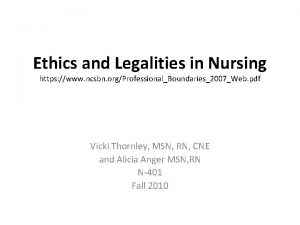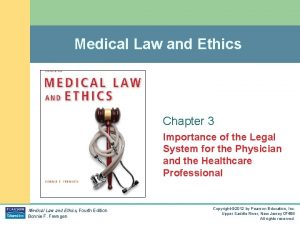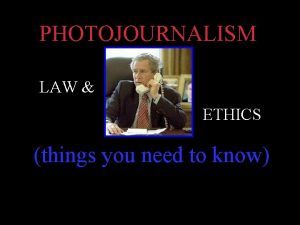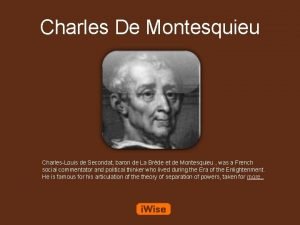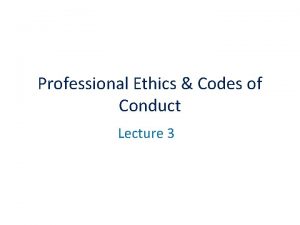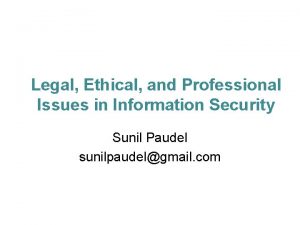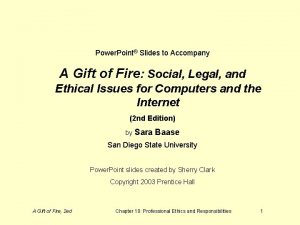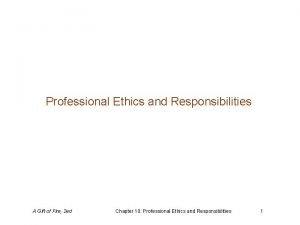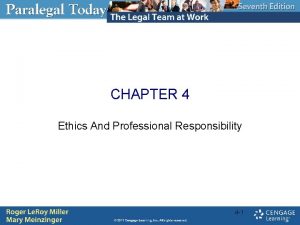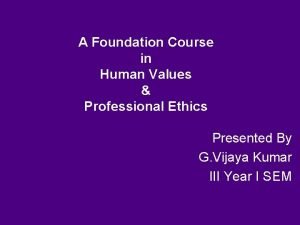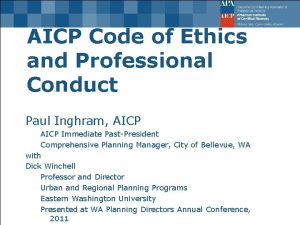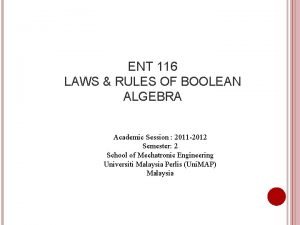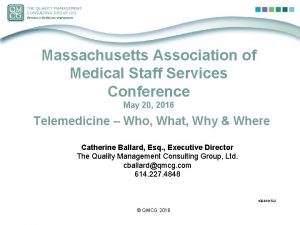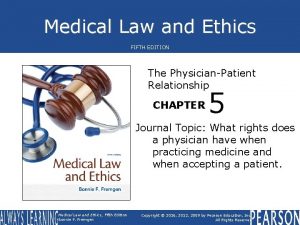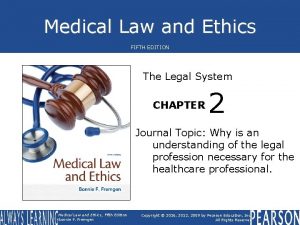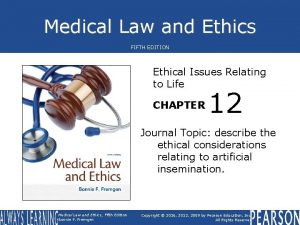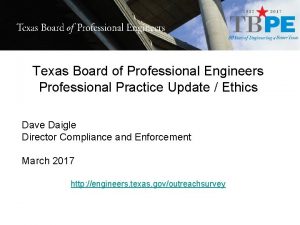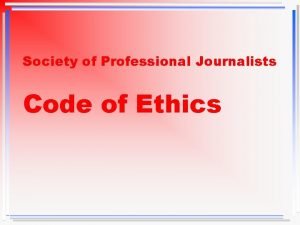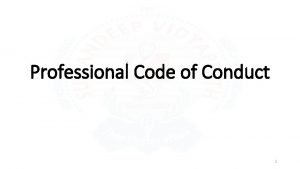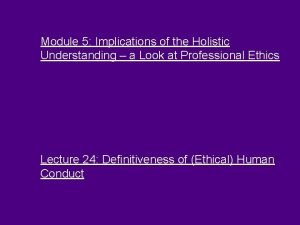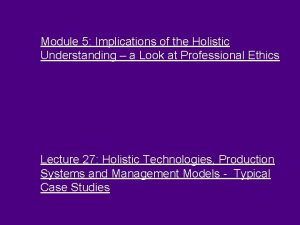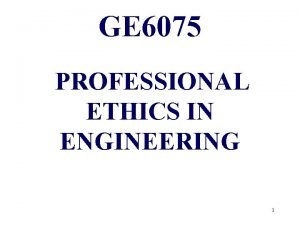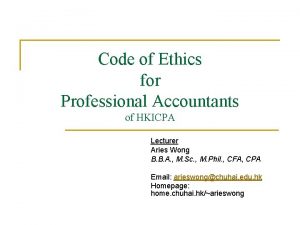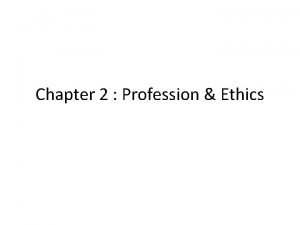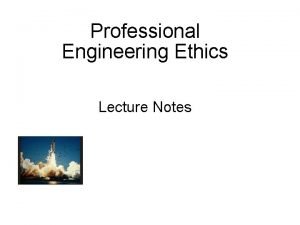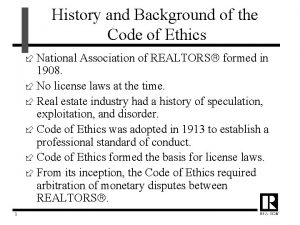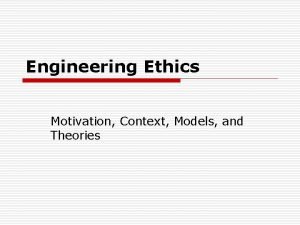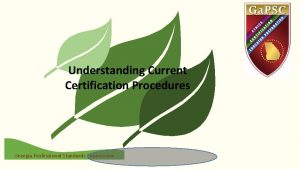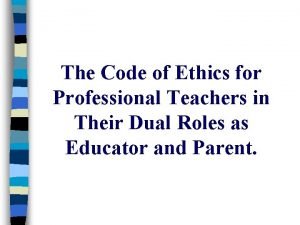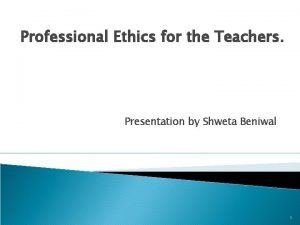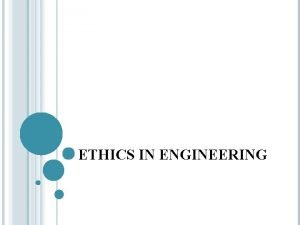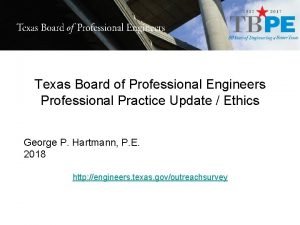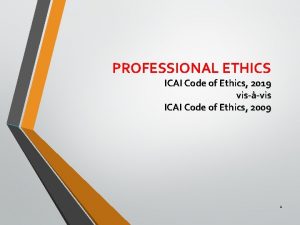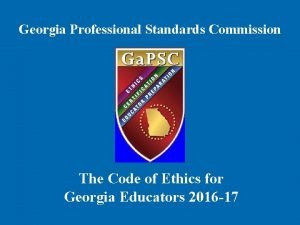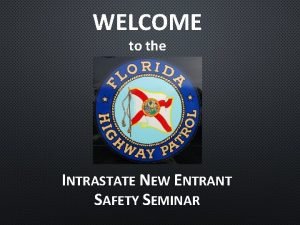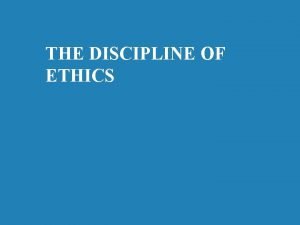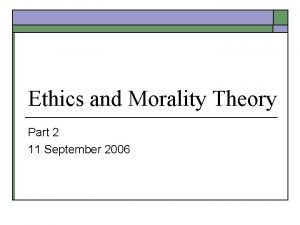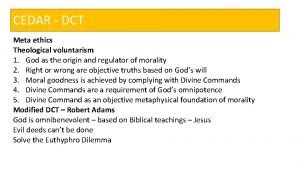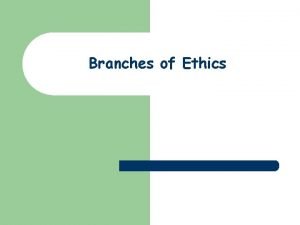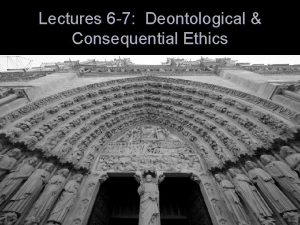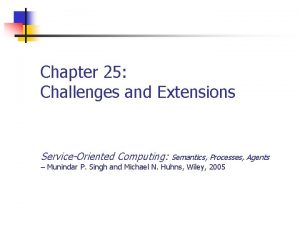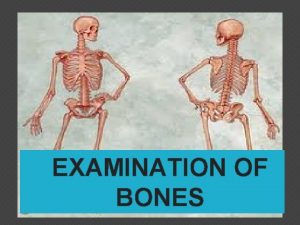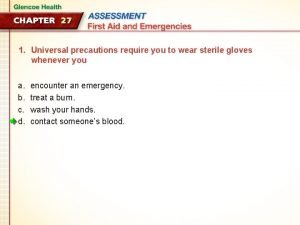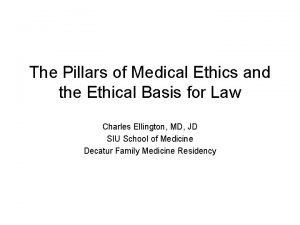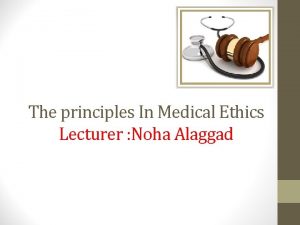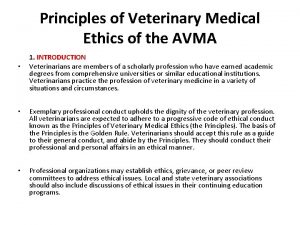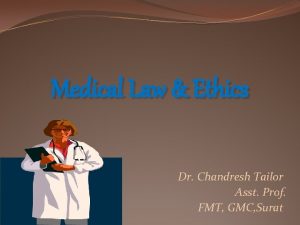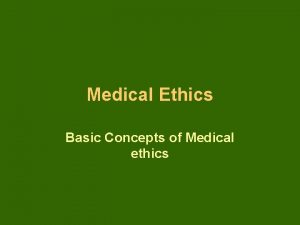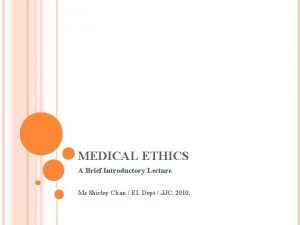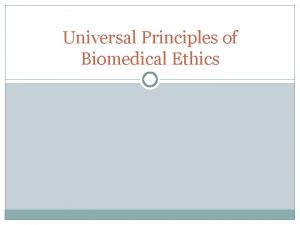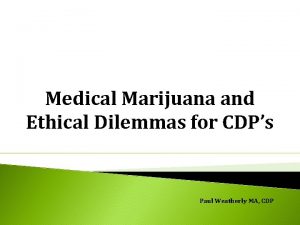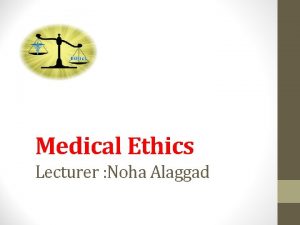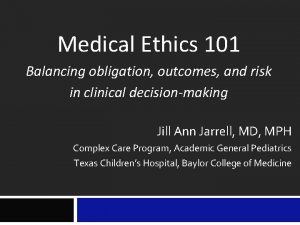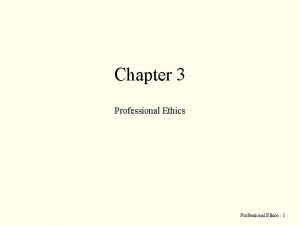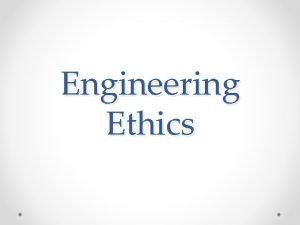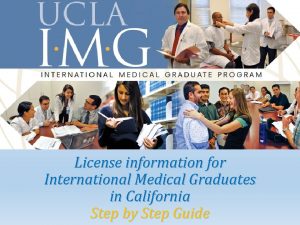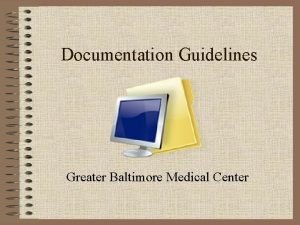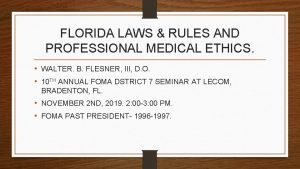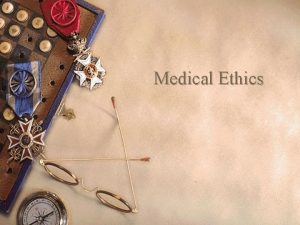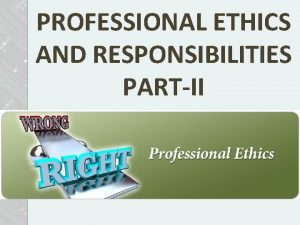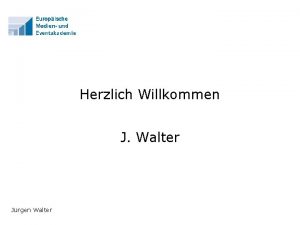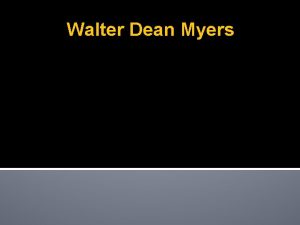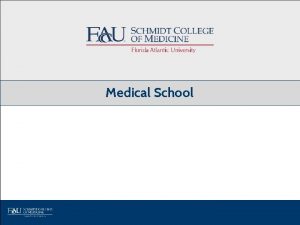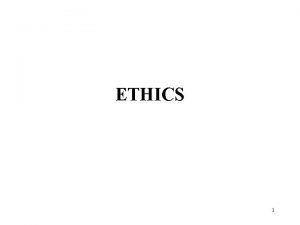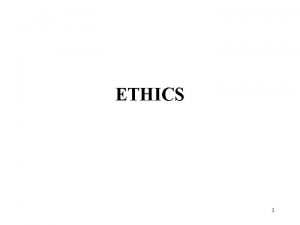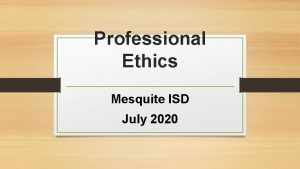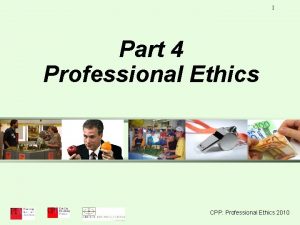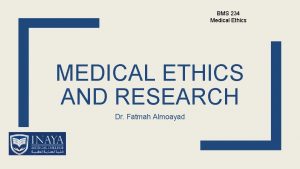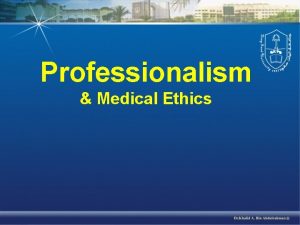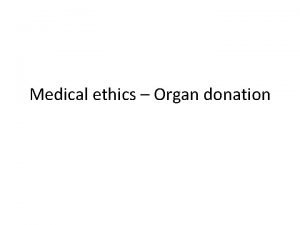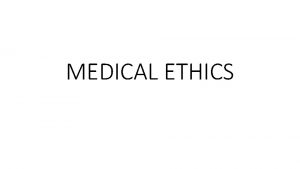FLORIDA LAWS RULES AND PROFESSIONAL MEDICAL ETHICS WALTER














































































- Slides: 78

FLORIDA LAWS & RULES AND PROFESSIONAL MEDICAL ETHICS. • WALTER. B. FLESNER, III, D. O. • 10 TH ANNUAL FOMA DSTRICT 7 SEMINAR AT LECOM, BRADENTON, FL. • NOVEMBER 2 ND, 2019. 2: 00 -3: 00 PM. • FOMA PAST PRESIDENT- 1996 -1997.

Disclosure Statement I have no financial relationship in regard to the content of this presentation.

Educational Objectives Florida Laws, Rules and Medical Ethics • Understanding of applicable Laws & Rules for licensed Osteopathic Physicians. • Knowledge of the disciplinary process. • Learning of rights afforded to physicians in licensure disciplinary cases. • Ability to locate applicable statutes and rules through online resources. • What constitutes medical ethics? • Why should I be concerned about medical ethics?

Why Laws, Rules and Medical Ethics? • Recently the Board of Osteopathic Medicine amended their rules for osteopathic physicians in Florida – changing the required CE hours for renewal to NOW include 2 hours of Prescribing Controlled Substances as a mandatory course and MUST be completed by January 31, 2019 if you are licensed in Florida and hold are authorized by the DEA to prescribe CS. • Also, the Board combined the one hour for laws and rules with the one hour for medical ethics. • There are still 5 mandatory hours for each biennium – this course, Medical Errors 2 hours, and Prescribing Controlled Substances 2 hours

What Fla Statute applies to ALL health care practitioners? A. Florida Statute 459 B. Florida Statute 456 C. Florida Statute 484 Part II D. Rule 64 B 15

What Fla Statute applies DO’s and PA’s/AA’s employed by DO’s? A. Florida Statute 459 B. Florida Statute 456 C. Florida Statute 484 Part II D. Rule 64 B 15

LICENSE RENEWAL Osteopathic Physician • Current licenses expire at midnight, Eastern Time, on March 31, 2020. • To ensure you receive your renewal notification from the department, your current mailing address must be on file. Failure to renew an active or inactive license by the expiration date will result in the license being placed in delinquent status. Failure by a delinquent licensee to renew before the expiration of the current licensure cycle renders the license null and void without any further action by the board or the department. • A licensee who remains on inactive status for more than two consecutive biennial licensure cycles and who wishes to reactivate the license may be required to demonstrate the competency to resume active practice by sitting for a special purpose examination or by completing other reactivation requirements. • • If you are reactivating your license, please refer to the Laws & Rules governing your practice for additional requirements. The department will renew your license upon receipt of: • • • Completed renewal application Required fees Updated Practitioner Profile Completed Physician Workforce Survey Completed Financial Responsibility Form NOTE- Domestic Violence is required every third biennium

2018 -2020 Requirements Osteopathic Physician REQUIRED SUBJECT REQUIRED NUMBER AREA OF HOURS • • General Hours* 20 General Hours* 15 IMPORTANT INFORMATION 20 must be AOA 1 -A These hours can be AOA or AMA Medical Errors 2 Must be live Florida Laws, Rules and Medical Ethics 1 Must be live Prescribing of Controlled Substances 2 Does not have to be live TOTAL HOURS 40** * Licensees must obtain 2 hours of domestic violence every third renewal period Of the 15 general hours, only 8 can be home study

NEW LAWS • HB 851 -HUMAN TRAFFICKING: EFFECTIVE JULY 1, 2019. • MUST TAKE COURSE BY JANUARY 1, 2021. COURSE WAS OFFERED AT SEPT. MID YEAR SEMINAR AND WILL BE OFFERED AGAIN AT THE FEB. 2020 FOMA CONVENTION. • ALSO BY JAN. 1, 2021 AN 11 X 15 SIGN MUST BE POSTED IN YOUR OFFICE. • HB 831 -ELECTRONIC PRESCRIBING: EFFECTIVE JANUARY 1, 2020 • ALL PRESCRIPTIONS GENERATE AND TRANSMIT ELECTRONIC • ALTHOUGH IT TAKES EFFECT 1/1/2020, IT APPLIES 3/31/2020.

Reports to CE BROKER • REPORT THE HOURS YOU RECEIVE HERE TODAY TO CE BROKER! CE BROKER IS THE STATEWIDE CLEARING HOUSE FOR ALL CONTINUING EDUCATION HOURS FOR HEALTH CARE PROFESSIONALS.


Who’s on First? • Dept. of Health (DOH) – licenses health care practitioners • Board of Osteopathic Medicine (Board) – rulemaking, and disciplinary hearings • Attorney Generals Office (AG) – provide an Attorney for the Board as Gen Counsel • Also, provide Attorney(s) from Prosecution Services Unit to represent DOH during prosecution of discipline before Board • District Court of Appeal (DCA) – court hears appeals from Board and DOAH • Div. of Admin. Hearings (DOAH)– court hears Formal hearings for disciplinary cases

I. Laws and Rules for Osteopathic Physicians Florida Statutes (F. S. ): Laws • Chapter 459: Osteopathic Medicine • Chapter 456: Health Professions and Occupations: General Provisions • Chapter 120: Administrative Procedure Act Florida Administrative Code (F. A. C. ): Rules • Rules: Chapter 64 B 15: Board of Osteopathic Medicine, F. A. C. • Rules: Chapter 64 B: Division of Medical Quality Assurance, F. A. C.

FS 456 GENERAL PROVISIONS HEALTH PROFESSIONS AND OCCUPATIONS: • 456. 001 Definitions • THROUGH • 456. 50 Repeated Medical Malpractice GENERAL HEALTH CARE PROVISION FOR ALL LICENSED HEALTH CARE PROVIDERS

456. 44 Florida Statute (not complete statute) (1) DEFINITIONS. — (a) “Acute pain” means the normal, predicted, physiological, and time-limited response to an adverse chemical, thermal, or mechanical stimulus associated with surgery, trauma, or acute illness. The term does not include pain related to: 1. Cancer. 2. A terminal condition. For purposes of this subparagraph, the term “terminal condition” means a progressive disease or medical or surgical condition that causes significant functional impairment, is not considered by a treating physician to be reversible without the administration of life-sustaining procedures, and will result in death within 1 year after diagnosis if the condition runs its normal course. 3. Palliative care to provide relief of symptoms related to an incurable, progressive illness or injury. 4. A traumatic injury with an Injury Severity Score of 9 or greater. (e) “Chronic nonmalignant pain” means pain unrelated to cancer which persists beyond the usual course of disease or the injury that is the cause of the pain or more than 90 days after surgery. (2) REGISTRATION. —Effective January 1, 2012, a physician licensed under chapter 458, chapter 459, chapter 461, or chapter 466 who prescribes any controlled substance, listed in Schedule II, Schedule III, or Schedule IV as defined in s. 893. 03, for the treatment of chronic nonmalignant pain, must: (a) Designate himself or herself as a controlled substance prescribing practitioner on the physician’s practitioner profile. (b) Comply with the requirements of this section and applicable board rules.

456. 44 Florida Statute (not complete statute) (4) STANDARDS OF PRACTICE FOR TREATMENT OF ACUTE PAIN. —The applicable boards shall adopt rules establishing guidelines for prescribing controlled substances for acute pain, including evaluation of the patient, creation and maintenance of a treatment plan, obtaining informed consent and agreement for treatment, periodic review of the treatment plan, consultation, medical record review, and compliance with controlled substance laws and regulations. Failure of a prescriber to follow such guidelines constitutes grounds for disciplinary action pursuant to s. 456. 072(1)(gg), punishable as provided in s. 456. 072(2). (5) PRESCRIPTION SUPPLY. — (a) For the treatment of acute pain, a prescription for an opioid drug listed as a Schedule II controlled substance in s. 893. 03 or 21 U. S. C. s. 812 may not exceed a 3 -day supply, except that up to a 7 -day supply may be prescribed if: 1. The prescriber, in his or her professional judgment, believes that more than a 3 -day supply of such an opioid is medically necessary to treat the patient’s pain as an acute medical condition; 2. The prescriber indicates “ACUTE PAIN EXCEPTION” on the prescription; and 3. The prescriber adequately documents in the patient’s medical records the acute medical condition and lack of alternative treatment options that justify deviation from the 3 -day supply limit established in this subsection. (b) For the treatment of pain other than acute pain, a prescriber must indicate “NONACUTE PAIN” on a prescription for an opioid drug listed as a Schedule II controlled substance in s. 893. 03 or 21 U. S. C. s. 812. (6) EMERGENCY OPIOID ANTAGONIST. —For the treatment of pain related to a traumatic injury with an Injury Severity Score of 9 or greater, a prescriber who prescribes a Schedule II controlled substance listed in s. 893. 03 or 21 U. S. C. s. 812 must concurrently prescribe an emergency opioid antagonist, as defined in s. 381. 887(1).

459. 0152(F. S. ) Specialties An osteopathic physician licensed under this chapter may not hold himself or herself out as a board-certified specialist unless the osteopathic physician has successfully completed the requirements for certification by the American Osteopathic Association or the Accreditation Council on Graduate Medical Education and is certified as a specialist by a certifying agency approved by the board. However, an osteopathic physician may indicate the services offered and may state that his or her practice is limited to one or more types of services when this accurately reflects the scope of practice of the osteopathic physician. History. —s. 34, ch. 97 -264.

FS 459 Osteopathic Medicine OSTEOPATHIC MEDICINE • 459. 001 Purpose. • THROUGH • 459. 026 Reports of adverse incidents in office practice settings. STATUTE APPLIES TO ALL DO’s and Physician assistants & Anesthesiologist Assistants.

459. 0141 (F. S. ) Sexual Misconduct in the practice of osteopathic medicine (also 456. 063, F. S. ^) • The osteopathic physician-patient relationship is founded on mutual trust. Sexual misconduct in the practice of osteopathic medicine means violation of the osteopathic physician-patient relationship through which the osteopathic physician uses the relationship to induce or attempt to induce the patient to engage, or to engage or attempt to engage the patient, in sexual activity outside the scope of the practice or the scope of generally accepted examination or treatment of the patient. Sexual misconduct in the practice of osteopathic medicine is prohibited. (^disqualification for licensure) • History. —ss. 13, 17, ch. 89 -374; s. 4, ch. 91 -429. (***Professional

459. 025, FS Formal supervisory relationships, standing orders, and established protocols; notice; standards. 1) NOTICE. —(a) When a physician enters into a formal supervisory relationship or standing orders with an emergency medical technician or paramedic licensed pursuant to s. 401. 27, which relationship or orders contemplate the performance of medical acts, or when a physician enters into an established protocol with an advanced registered nurse practitioner, which protocol contemplates the performance of medical acts set forth in s. 464. 012(3) and (4), the physician shall submit notice to the board. The notice shall contain a statement in substantially the following form: I, (name and professional license number of physician) , of (address of physician) have hereby entered into a formal supervisory relationship, standing orders, or an established protocol with (number of persons) emergency medical technician(s), (number of persons) paramedic(s), or (number of persons) advanced registered nurse practitioner(s).

459. 012 Florida Statute Itemized patient statement • Whenever an osteopathic physician licensed under this chapter renders professional services to a patient, the osteopathic physician is required, upon request, to submit to the patient, the patient’s insurer, or the administrative agency for any federal or state health program under which the patient is entitled to benefits an itemized statement of the specific services rendered and the charge for each, no later than the osteopathic physician’s next regular billing cycle which follows the fifth day after the rendering of professional services. An osteopathic physician may not condition the furnishing of an itemized statement upon prior payment of the bill. Whenever the itemized statement is submitted to the patient’s insurer or the administrative agency, a copy of the itemized statement shall simultaneously be provided to the patient. Such copy of the itemized statement which is sent to the patient shall, in boldfaced letters, state that: “THIS IS A DUPLICATE COPY OF A STATEMENT SUBMITTED TO YOUR INSURER OR OTHER AGENCY. ” • History. —s. 4, ch. 79 -198; s. 2, ch. 81 -318; ss. 13, 27, 29, ch. 86 -290; s. 4, ch. 91 -429.

Rule 64 B 15 Osteopathic Medicine • • • 64 B 15 -6 PHYSICIAN ASSISTANT(19) 64 B 15 -7 ANESTHESIOLOGIST ASSISTANTS (14) 64 B 15 -9 PROCEDURE (6) 64 B 15 -10 FEES (12) 64 B 15 -12 EXAMINATIONS AND LICENSURE (10) 64 B 15 -13 CONTINUING EDUCATION (6) 64 B 15 -14 PRACTICE REQUIREMENTS (16) 64 B 15 -15 MEDICAL RECORDS (5) • 64 B 15 -19 DISCIPLINARY GUIDELINES (10) 64 B 15 -16 RESIDENT INTERNSHIP (2) 64 B 15 -18 PRESCRIPTIONS OF CERTAIN MEDICINAL DRUGS BY PHARMACISTS (4) • • 64 B 15 -20 FINANCIAL RESPONSIBILITY (3) 64 B 15 -22 REGISTRATION OF HOSPITAL RESIDENTS AND INTERNS (4)

MEDICAL MARIJUANA RULES To access the medical marijuana consent form visit: • https: //floridasosteopathicmedicine. gov/forms/med ical-marijuana-consent-form. pdf To access the medical marijuana statutorily required documentation form visit: • https: //floridasosteopathicmedicine. gov/forms/statutorily-required -documentation-smm. pdf

64 B 15 -19. 007 Citations (1) As used in this rule, “citation” means an instrument which meets the requirements set forth in Section 456. 077, F. S. , and which is served upon a licensee or certificate holder for the purpose of assessing a penalty in an amount established by this rule. (2) In lieu of the disciplinary procedures contained in Section 456. 073, F. S. , the Department is hereby authorized to dispose of any violation designated herein by issuing a citation to the subject for a complaint that is the basis for the citation. (3) The following violations with accompanying fines may be disposed of by citation. If it is not listed as a citation, then it is handled through a FORMAL

II. Investigations Florida Department of Health (DOH) How can an investigation begin? 1) Upon written complaint signed by complaining individual; 2) Anonymous Complaint; 3) Confidential Informant complaint; and 4) DOH. Does the Department tell me if I am being investigated? Notice of Investigation – letter of investigation. Exceptions = Criminal charge or DOH believes notice will be detrimental to investigation

Due Process Rights Constitutional right to remain silent 5 th Amendment Due Process right to remain silent as applied to the Federal Government 14 th Amendment Due Process right to remain silent as applied to the States You DO NOT have to respond to any questions by DOH investigator ALL communications - through your attorney

WHAT RIGHTS? Question: What exactly does it mean when an officer says, "You have the right to remain silent? ”

Right to Remain Silent Contact by DOH You need to fully understand your rights. After you receive written notification about investigation, you will receive a phone call from a Department Investigator He/She will try to convince you he/she is your friend Often DOH Investigators will try to convince you there is nothing to this Complaint – talk to us and we will close it out! (not always a true statement)

Why should I invoke my right to remain silent? Physician receives letter of investigation for improper advertising, the physician failed to conspicuously identify the osteopathic physician by name in the advertisement or failed to conspicuously identify the osteopathic physician referred to in the advertising as an osteopathic physician. 64 B 15 -14. 001(2)(k), FAC *Violation is considered a Citation 64 B 15 -19. 007(2)(f) FAC Physician decided not to remain silent but to write the DOH on his own behalf…. result?

Why should I invoke my right to remain silent? Response? Physician writes letter to DOH on letterhead without correctly identifying himself as DO. , only – Dr. John Doe Physician received initial letter for failing to identify Dr. as DO and in letter to DOH he again failed to identify himself on letterhead as DO. – so, Dr receives a second complaint!!!!! If letter written by Attorney No Second Violation, letter by Dr. and because second complaint it is NO LONGER a Minor Violation

TO WAIVE OR NOT WAIVE? Republican lawmakers on Friday passed a resolution declaring that an Internal Revenue Service official waived her Fifth Amendment right last month when she proclaimed her innocence at a congressional hearing, but legal experts said the vote is all but meaningless. The House Oversight Committee called Lois Lerner to testify May 14 about the agency’s inappropriate scrutiny of groups seeking tax-exempt status. Before invoking her Fifth Amendment right against self-incrimination, Lerner told the committee: “I have not done anything wrong. I have not broken any laws. I have not violated any IRS rules or regulations, and I have not provided false information to this or any other congressional committee. ” Lerner’s attorney has said she is part of a Justice Department criminal investigation. The IRS has placed her on administrative leave.

“With the advice of counsel sitting right behind her, she testified to nine different factual assertions, ” Rep. Trey Gowdy (R-S. C. ) said Friday. “The case law is clear. That is not the way the Fifth Amendment works. ” Legal experts questioned the oversight committee’s resolution. Alan M. Dershowitz, a Harvard law professor and Fifth Amendment rights specialist who has said Lerner’s comments were a mistake, still criticized Friday’s vote as political. “It has no legal impact at all, ” he said. Andrew D. Leipold, a criminal law and procedure professor with the University of Illinois, agreed with Dershowitz. “Just because Congress says that her Fifth Amendment right is waived doesn’t mean it’s actually waived, ” Leipold said. Nonetheless, Friday’s resolution paves the way for committee chairman Darrell Issa (R-Calif. ) to recall Lerner for questioning. The Republican-led panel could vote to hold Lerner in contempt if she pleads the Fifth again, and that could lead to a legal battle.

OH NO, MAYBE I WAIVED!

Ranking Democrat Elijah E. Cummings (Md. ) said the panel should hear from legal experts before voting, but the idea was rejected. “This is not a responsible record to put forward, because it undermines the credibility of this committee and the legitimacy of the resolution itself, ” Cummings said. Rep. Gerald E. Connolly (D-Va. ) called the proceedings, which ended in a 22 to 17 party-line vote, an “egregious abuse of power that tramples the Constitution. ” Lerner’s attorney, William W. Taylor III, said the resolution would have no legal impact. “Her rights under the constitution are no different now than they were when she asserted them, ” he said in a statement. Ali Ahmad, Issa’s spokesman, said the panel hasn’t decided whether to call Lerner again, but he added that the chairman recessed the May hearing instead of adjourning, creating the option. Dershowitz said lawmakers could force her to testify by focusing on her brief remarks. “Once you have put forward affirmative statements, you have to answer questions about those affirmative statements, ” he said. “They would have to glove-fit the questions to what she said, and then she can’t take the Fifth. ”

Letter from DOH At this point, you SHOULD HAVE an attorney – sound legal advice DOH – MUST promptly furnish a copy of complaint or document Within 45 days – you MUST submit a written response - it MUST be considered by probable cause panel for the Board of Osteopathic Medicine An attorney is able to extend the response timeframe through properly filed motions

DOH Resources Investigative Subpoena’s Supported by Affidavit Departments initiative or request by probable cause The validity may be challenged – Was it unlawfully issued? It is unreasonably broad in scope or Requires production of unreasonable materials Investigative Depositions - Be aware – using deposition at subsequent formal hearing against you DOH may take depositions – own initiative or request probable cause panel; DOH gives you NO NOTICE

Investigation Conclusion Entire investigative report with all exhibits is forwarded to Departments legal section in Tallahassee – *If a Citation or Minor Violation, then case does NOT go to PCP – licensee receives notice of Citation or Notice of Noncompliance. Physician then either accepts and complies; or, does not accept and then regular disciplinary process resumes. Case then presented to PCP to determine whether probable cause exists and an administrative complaint issued. If no finding of probable cause – case dismissed. PCP = Probable Cause Panel

III. 64 B 15 -19. 007 Citations (a) - Falsely certifying compliance with required continuing medical education hours for the purpose of renewing a license or certificate. The fine shall be $2, 000. (b) - Failure to keep current mailing or practice address on file with the Board. The fine shall be $250. (c) - Failure to register as a dispensing practitioner. The fine shall be $500. (i) Failure to timely provide medical records, upon request to a patient or a patient’s legal representative. The fine shall be $500. (j) Charging copying fees for patient records in violation of Rule 64 B 15 -15. 003, F. A. C. The fine shall be $750. 00.

Affect of Citations If the subject does not dispute the matter in the citation in writing within 30 days after the citation is served by personal service or within 30 days after receipt by certified mail, the citation shall become a final order of the Board. . Failure to pay the fine and costs within the prescribed time period constitutes a violation of F. S. , which will result in further disciplinary action. All fines and costs are to be made payable to “Department of Health – Citation. ” (5) Once the citation becomes a final order, the citation and complaint become a public record pursuant to Chapter 119, F. S. , unless otherwise exempt from the provisions of Chapter 119, F. S. The citation and complaint may be considered as aggravating circumstances in future disciplinary actions.

IV. Probable Cause Panel (PCP) 456. 073, FS (4) The determination as to whether probable cause exists shall be made by majority vote of a probable cause panel of the board, or by the department, as appropriate. Each board may provide by rule for multiple probable cause panels composed of at least two members. Each board by rule establishes members of PCP. 64 B 15 -9. 006 (1) The probable cause panel shall be composed of at least two (2) members and not more than three (3) members. 1 BOOM Board Member, 2 may be professional or former consumer board member, and no more than 1 lay member. (4) The determination as to whether probable cause exists that a violation of the provisions of Chapters 456 and 459, F. S. , and/or the rules promulgated pursuant thereto, has occurred shall be made by a majority vote of the probable cause panel of the Board.

Recordings of PCP Electronically record all proceedings; Recorded by a certified court reporter Transcripts may be obtained from the court reporter, Request copy of transcript of the probable cause panel proceeding – must meet test of being “meaningful” – Discussion of evidence by PC members Must be some evidence to reasonably indicate finding of PC The Department must justify actions but board may Not just “rubber stamp” recommendation Transcript - the best place to start

Findings of PCP NO Probable Cause = Case dismissed or receipt of Letter of concern Violation exists – formal charges not being filed Issued without an opportunity for hearing or to refute or dispute allegations Becomes public record Unclear – considered disciplinary actions YES Probable Cause = Formal charges – Administrative Complaint

V. Administrative Complaint and Election of Rights Administrative complaints are sent to a licensee after conclusion of the investigation, presentation to the probable cause panel, and sent with a form titled – Election of Rights. The sending of the Administrative Complaint by DOH is deemed served upon the licensee after mailing, and should never be ignored.

Election of Rights Once received, you must file within 21 days and Failure to file – licensee in default and license may be suspended by the DOH Extension of time from department through legal counsel or request Three ways to proceed (must choose only one way to proceed): Formal hearing Informal hearing

Election of Rights Formal Hearing before a hearing officer DOA Hearings Full evidentiary hearing – DOH must meet its burden of proving up the material Quite similar to a criminal or civil case Absolutely foolish – to go this route WITHOUT legal assistance

Election of Rights • Informal Hearing – before the Board of Osteopathic Medicine. • Physician MUST NOT dispute the facts of the alleged complaint. • Physician goes before BOOM and presents testimony/evidence requesting for leniency in their penalties for the violation. • BOOM can reduce penalties, keep the penalties as offered by the Prosecutor, increase the penalties, or go as far as reduce the charges or dismiss the complaint. • Physician should go with counsel, or at the least, after consultation with counsel.

Election of Rights • Settlement Agreement – presented by the Prosecutor to resolve the matter. • Physician will have to appear before the BOOM for the Board to accept. • Physician’s appearance will be after agreeing to the Prosecutor’s negotiated penalties for the alleged violations in the complaint. • BOOM may accept the Agreement, or reject the Agreement. If BOOM rejects, they will make a counter-offer to resolve the matter. The physician can either accept the counter-offer immediately, or up to 7 -14 days later; or reject the counter-offer and go to either a Formal or Informal Hearing (likely to have same result at Informal Hearing as the counter-offer.

Prosecution of Administrative Complaint Licensee has due process PROPERTY rights, including, but not limited to: Right to Remain Silent Proper and adequate notice and adequate time to respond See agency’s investigative file, called discovery including subpoena’s issues, depositions Right to Counsel with Right to Examine and cross examine witnesses

Prosecution of Administrative Complaint Attorney’s from the Attorney General’s office presents the case to the Full Board of Osteopathic Medicine for Informal Hearings or Settlement Agreements & to the Administrative Law Judge for Formal Hearings After completion of the case, and a finding of guilt by either the Board or ALJ, an Order is entered with penalties: Penalties can include a reprimand, probation, practice restrictions, or revocation of licensure.

Prosecution Penalties 64 B 15 -19. 002(4) False, deceptive or misleading advertising. (459. 015(1)(d)FS) 1 st offense letter of concern to reprimand $1 k fine, 2 nd offense probation and up to $5 k fine, 3 rd offense up to 1 yr suspension followed by probation up to $5 k fine (11) Kickbacks and unauthorized fee arrangements. (459. 015(1)(j)FS) 1 st offense probation or suspension and up to $5 k fine or denial, 2 nd offense denial, revocation, or suspension followed by probation up to $10 k fine. (35) Presigning blank prescription forms. (459. 015(1)(ee), FS) 1 st offense reprimand or suspension and $5 k fine, 2 nd offense probation/revocation up to $10 k fine

Judicial Review and Stays of Final Order Upon Order, one party wins – one party loses. If you lose, you can file a Motion to Stay the Order while you Appeal! The burden of proof is on the agency to prove probable danger to the community. You will be the unhappy party; Rarity – Department feels need to appeal the decision! Seek judicial review – District Court of Appeal. Five District Court of Appeals Each has jurisdiction to hear appeals from licensing boards final orders

VI. Changes in Laws and Rules - CME Florida passed Human Trafficking, Chapter 2019 -152, Laws of Florida, which establishes new profession requirements including newly required signs, CE/CME, and more for the following professions: Acupuncture, Medicine, Osteopathic Medicine, Chiropractic Medicine, Podiatric Medicine, Optometry, Pharmacy, Dentistry, Nursing Home Administration, Occupational Therapy, Dietetics and Nutrition, Respiratory Care, Massage Therapy, and Physical Therapy. The Department has launched an informational website that includes a breakdown of the new law and addresses areas of: (1) signs; (2) CE/CME; (3) FAQs; (4) Specific Board of Massage requirements; and (5) Human Trafficking Reporting. For more information please visit: http: //www. flhealthsource. gov/humantrafficking/

Changes in Laws and Rules - CME House Bill 451, Nonopioid Alternatives, was approved by Governor De. Santis and is effective July 1, 2019. The bill requires that before providing anesthesia or prescribing, ordering, dispensing, or administering an opioid listed as a Schedule II controlled substance to treat pain, the patient must be informed about available nonopioid alternatives. A healthcare practitioner will discuss the advantages and disadvantages of using nonopioid alternatives. Under the new law, the department is required to develop an educational pamphlet about using nonopioid alternatives and post the pamphlet on the department’s website. Healthcare practitioners must provide the patient with this educational pamphlet. Those healthcare practitioners providing emergency services and care exempt from these requirements. Pamphlet found at: http: //www. flhealthsource. gov/files/HB 451_pamphlet_6 -28 -19. pdf

Changes in Laws and Rules - Telehealth Florida passed Telehealth, Chapter 2019 -137, Laws of Florida, which establishes standards of practice for telehealth services, including patient evaluations, recordkeeping, and controlled substances prescribing. The law also authorizes out-of-state health care practitioners to perform telehealth services for patients in Florida upon meeting certain eligibility requirements and registering with the department of health. The Department is currently working on the implementation of the Telehealth law and expects the application for out-of-state providers to be available in early fall 2019. Please continue to check the website for updates. For questions, contact the Florida Department of Health at MQA. Telehealth@flhealth. gov

Florida Changes in Laws 456. 44 Controlled substance prescribing. (1) DEFINITIONS. AS used in this section, the term: (a) "Acute pain" means the normal, predicted, physiological, and time—limited response to an adverse chemical, thermal, or mechanical stimulus associated with surgery, trauma, or acute illness. The term does not include pain related to: 1. Cancer. 2. A terminal condition. For purposes of this subparagraph, the term "terminal condition" means a progressive disease or medical or surgical condition that causes significant functional impairment, is not considered by a treating physician to be reversible without the administration of life—sustaining procedures, and will result in death within 1 year after diagnosis if the condition runs its normal course. 3. Palliative care to provide relief of symptoms related to an incurable, progressive illness or injury. 4. A traumatic injury with an Injury Severity Score of 9 or greater.

Florida Changes in Laws • (4) STANDARDS OF PRACTICE FOR TREATMENT OF ACUTE PAIN. *The applicable boards shall adopt rules establishing guidelines for prescribing controlled substances for acute pain, including evaluation of the patient, creation and maintenance of a treatment plan, obtaining informed consent and agreement for treatment, periodic review of the treatment plan, consultation, medical record review, and compliance with controlled substance laws and regulations. Failure of a prescriber to follow such guidelines constitutes grounds for disciplinary action pursuant to s. 456. 072(1)(gg), punishable as provided in s. 456. 072(2).

Florida Changes in Laws (5) PRESCRIPTION SUPPLY. ’ (a) For the treatment of acute pain, a prescription for an opioid drug listed as a Schedule II controlled substance in s. 893. 03 or 21 U. S. C. s. 812 may not exceed a 3—day supply, except that up to a 7—day supply may be prescribed if: 1. The prescriber, in his or her professional judgment, believes that more than a 3—day supply of such an opioid is medically necessary to treat the patient's pain as an acute medical condition; 2. The prescriber indicates "ACUTE PAIN EXCEPTION" on the prescription; and 3. The prescriber adequately documents in the patient's medical records the acute medical condition and lack of alternative treatment options that justify deviation from the 3— day supply limit established in this subsection. (b) For the treatment of pain other than acute pain, a prescriber must indicate "NONACUTE PAIN" on a prescription for an opioid drug listed as a Schedule II controlled substance in s. 893. 03 or 21 U. S. C. s. 812. (6) EMERGENCY OPIOID ANTAGONIST. For the treatment of pain related to a traumatic injury with an Injury Severity Score of 9 or greater, a prescriber who prescribes a Schedule II controlled substance listed in s. 893. 03 or 21 U. S. C. s. 812 must concurrently prescribe an emergency opioid antagonist, as defined in s. 381. 887(1).

MEDICAL MARIJUANA

SB 182 -MEDICAL USE OF MARIJUANA • BECAME LAW MARCH 20, 2019. REMOVES PROHIBITION OF SMOKABLE MEDICAL MARIJUANA BUT PROHIBITS SMOKING IN PUBLIC AND IN ENCLOSED INDOOR WORKPLACE. • ALLOWS PHYSICIANS TO CERTIFY PATIENTS FOR SIX 35 -DAY SUPPLY LIMITS OF SMOKABLE MARIJUANA AND ALLOWS MEDICAL MARIJUANA CENTERS TO DISPENSE 2. 5 OZ. OF SMOKABLE MARIJUANA OR AMOUNT AUTHORIZED BY DOH. • BOM AND BOOM ARE TO CREATE STANDARDS FOR CERTIFICATION OF SMOKING AS ROUTE OF ADMINISTRATION. • REQUIRES CERTIFYING PHYSICIAN TO PROVIDE DOCUMENTATION DEMNSTRATING EFFECTIVENESS FOR SMOKING MARIJUANA FOR THEIR CONDITION.

Medical Ethics – Why should I be concerned? AOA Code of Ethics The American Osteopathic Association has formulated this Code to guide its member physicians in their professional lives. The standards presented are designed to address the osteopathic physician's ethical and professional responsibilities to patients, to society, to the AOA, to others involved in health care and to self. Further, the American Osteopathic Association has adopted the position that physicians should play a major role in the development and instruction of medical ethics.

What is Medical Ethics? Medical ethics involves examining a specific problem, usually a clinical case, and using values, facts, and logic to decide what the best course of action should be. Some ethical problems are fairly straightforward, such as determining right from wrong. But others can also be more perplexing, such as deciding between two "rights"—two values that are in conflict with each other—or deciding between two different value systems, such as the patient's versus the doctor's. Doctors may deal with a great variety of perplexing ethical problems even in a small medical practice. Here are some common problems identified in a 2016 Medscape survey, where at least some physicians held different opinions

What are the Basic Principles of Medical Ethics? because treatment is not equally available to all people. Autonomy Requires that the patient have autonomy of thought, intention, and action when making decisions regarding health Beneficence Requires that the procedure be provided with the intent of care procedures. Therefore, the decision-making process must be free of coercion or coaxing. In order for a patient to doing good for the patient involved. Demands that health care providers develop and maintain skills and knowledge, make a fully informed decision, she/he must understand all continually update training, consider individual circumstances risks and benefits of the procedure and the likelihood of success. Because ARTs are highly technical and may involve of all patients, and strive for net benefit. high emotions, it is difficult to expect patients to be operating Non-maleficence under fully-informed consent. Requires that a procedure does not harm the patient involved or others in society. Infertility specialists operate under the Justice The idea that the burdens and benefits of new or experimental assumption that they are doing no harm or at least minimizing harm by pursuing the greater good. However, because treatments must be distributed equally among all groups in society. Requires that procedures uphold the spirit of existing assistive reproductive technologies have limited success rates uncertain overall outcomes, the emotional state of the patient laws and are fair to all players involved. The health care may be impacted negatively. In some cases, it is difficult for provider must consider four main areas when evaluating justice: fair distribution of scarce resources, competing needs, doctors to successfully apply the do no harm principle. rights and obligations, and potential conflicts with established legislation. Reproductive technologies create ethical dilemmas

Examples of medical ethics scenarios • Withholding treatment to meet an organization's • Reporting an impaired colleague; budget, or because of insurance policies; • Cherry-picking patients; • Accepting money from pharmaceutical or device manufacturers; • Prescribing a placebo; • Upcoding to get treatment covered; • Getting romantically involved with a patient or family member; • Covering up a mistake; • Practicing defensive medicine to avoid malpractice lawsuits; • Dropping insurers; and • Breaching patient confidentiality owing to a health risk.

Medical ethics issues? The Medical Practice Act defines unprofessional conduct in each state. Although laws vary from state to state, some examples of unprofessional conduct include the following: Physician abuse of a patient Inadequate record keeping Failing to meet the standard of care Prescribing drugs in excess or without legitimate reason Failing to meet continuing medical education requirements Dishonesty Conviction of a felony Delegating the practice of medicine to an unlicensed individual Minor fee disagreements and poor customer service are not considered unprofessional conduct.

TATOOS, WHAT ARE THEY GOOD FOR?

Paramedics brought to the emergency department an unconscious 70 -year-old man with “Do Not Resuscitate” tattooed on his chest. The ICU team decided to honor the preference expressed in the tattoo. Subsequently, a copy of his written DNR request was obtained. But in the new case, the man's doctors were conflicted about the decision not to honor the tattoo, because of "the patient's extraordinary effort to make his presumed advance directive known. " So they consulted a medical ethics expert, who advised the doctors to honor the patient's tattoo. The expert "suggested that it was most reasonable to infer that the tattoo expressed an authentic preference, " the report said. Later, the hospital found that the man actually did have an official DNR order with the Florida Department of Health. The man's doctors were "relieved" to find that their decision matched this official request. The man's condition soon deteriorated, and he died without undergoing CPR or invasive life-support methods. The doctors conclude that "this patient’s tattooed DNR request produced more confusion than clarity, " and that the case "neither supports nor opposes the use of tattoos to express end-of-life wishes. " The report was published Nov. 30 in the New England Journal of Medicine.

456. 059 Communications confidential; exceptions. • Communications between a patient and a psychiatrist, as defined in s. 394. 455, shall be held confidential and shall not be disclosed except upon the request of the patient or the patient’s legal representative. Provision of psychiatric records and reports shall be governed by s. 456. 057. Notwithstanding any other provision of this section or s. 90. 503, where: • (1) A patient is engaged in a treatment relationship with a psychiatrist; • (2) Such patient has made an actual threat to physically harm an identifiable victim or victims; and • (3) The treating psychiatrist makes a clinical judgment that the patient has the apparent capability to commit such an act and that it is more likely than not that in the near future the patient will carry out that threat, • the psychiatrist may disclose patient communications to the extent necessary to warn any potential victim or to communicate threat to a law enforcement agency. No civil or criminal action shall be instituted, and there shall be no liability on account of disclosure of otherwise confidential communications by a psychiatrist in disclosing a threat pursuant to this section.

456. 063 Sexual misconduct; disqualification for license, certificate, or registration (1) Sexual misconduct in the practice of a health care profession means violation of the professional relationship through which the health care practitioner uses such relationship to engage or attempt to engage the patient or client, or an immediate family member, guardian, or representative of the patient or client in, or to induce or attempt to induce such person to engage in, verbal or physical sexual activity outside the scope of the professional practice of such health care profession. Sexual misconduct in the practice of a health care profession is prohibited. (2) Each board within the jurisdiction of the department, or the department if there is no board, shall refuse to admit a candidate to any examination and refuse to issue a license, certificate, or registration to any applicant if the candidate or applicant has: (a) Had any license, certificate, or registration to practice any profession or occupation revoked or surrendered based on a violation of sexual misconduct in the practice of that profession under the laws of any other state or any territory or possession of the United States and has not had that license, certificate, or registration reinstated by the licensing authority of the jurisdiction that revoked the license, certificate, or registration; or (b) Committed any act in any other state or any territory or possession of the United States which if committed in this state would constitute sexual misconduct. For purposes of this subsection, a licensing authority’s acceptance of a candidate’s relinquishment of a license which is offered in response to or in anticipation of the filing of administrative charges against the candidate’s license constitutes the surrender of the license. (3) Licensed health care practitioners shall report allegations of sexual misconduct to the department, regardless of the practice setting in which the alleged sexual misconduct occurred.

Patient Boundaries Case Study Physician saw patient in his office as a things to the patient regarding her patient. body and how he wanted to touch her. Then he started calling her, multiple times, to offer a job. Action taken: Later he called back and was “breathing heavily and his tone of voice had Revocatio n changed”. He proceed to stated inappropriate

Its only my ethics, Right? 456. 072(1)(i) Except as provided in s. 465. 016, failing to report to the department any person who the licensee knows is in violation of this chapter, the chapter regulating the alleged violator, or the rules of the department or the board. However, a person who the licensee knows is unable to practice with reasonable skill and safety to patients by reason of illness or use of alcohol, drugs, narcotics, chemicals, or any other type of material, or as a result of a mental or physical condition, may be reported to a consultant operating an impaired practitioner program as described in s. 456. 076 rather than to the department.

456. 072(1) other ethical violations (n) Exercising influence on the patient or client for the purpose of financial gain of the licensee or a third party. (u) Failing to comply with the requirements of ss. 381. 026 and 381. 0261 to provide patients with information about their patient rights and how to file a patient complaint. (v) Engaging or attempting to engage in sexual misconduct as defined and prohibited in s. 456. 063(1).

AOA Code of Ethics Section 1. The physician shall keep in confidence whatever she/he may learn about a patient in the discharge of professional duties. Information shall be divulged by the physician when required by law or when authorized by the patient. Section 2. The physician shall give a candid account of the patient's condition to the patient or to those responsible for the patient's care. must have complete freedom to choose patients whom she/he will serve. However, the physician should not refuse to accept patients for reasons of discrimination, including, but not limited to, the patient's race, creed, color, sex, national origin, sexual orientation, gender identity or handicap. In emergencies, a physician should make her/his services available. Section 4. A physician is never justified in Section 3. A physician-patient relationship must be abandoning a patient. The physician shall give due founded on mutual trust, cooperation, and respect. notice to a patient or to those responsible for the The patient, therefore, must have complete patient's care when she/he withdraws from the case freedom to choose her/his physician. The physician so that another physician may be engaged.

AOA Code of Ethics Section 5. A physician shall practice in accordance with the body of systematized and scientific knowledge Section 7. Under the law a physician may advertise, related to the healing arts. A physician shall maintain but no physician shall advertise or solicit patients directly or indirectly through the use of matters or competence in such systematized and scientific activities which are false or misleading. knowledge through study and clinical applications. Section 6. The osteopathic medical profession has an Section 8. A physician shall not hold forth or indicate obligation to society to maintain its high standards and, possession of any degree recognized as the basis for therefore, to continuously regulate itself. A substantial licensure to practice the healing arts unless he is actually licensed on the basis of that degree in the part of such regulation is due to the efforts and influence of the recognized local, state and national state in which she/he practices. A physician shall designate her/his osteopathic school of practice in all associations representing the osteopathic medical profession. A physician should maintain membership in professional uses of her/his name. Indications of specialty practice, membership in professional and actively support such associations and abide by their rules and regulations. societies, and related matters shall be governed by rules promulgated by the American Osteopathic Association.

AOA Code of Ethics Section 9. A physician should not hesitate to seek consultation law by all proper means in order to improve patient care and public health. whenever she/he believes it advisable for the care of the patient. Section 14. In addition to adhering to the foregoing ethical standards, a physician shall recognize a responsibility to Section 10. In any dispute between or among physicians participate in community activities and services. involving ethical or organizational matters, the matter in controversy should first be referred to the appropriate Section 15. It is considered sexual misconduct for a physician arbitrating bodies of the profession. to have sexual contact with any current patient whom the physician has interviewed and/or upon whom a medical or Section 11. In any dispute between or among physicians surgical procedure has been performed. regarding the diagnosis and treatment of a patient, the attending physician has the responsibility for final decisions, consistent with any applicable hospital rules or regulations. Section 12. Any fee charged by a physician shall compensate the physician for services actually rendered. There shall be no division of professional fees for referrals of patients. Section 13. A physician shall respect the law. When necessary a physician shall attempt to help to formulate the

AOA Code of Ethics Section 16. Sexual harassment by a physician is considered unethical. Sexual harassment is defined as physical or verbal intimation of a sexual nature involving a colleague or subordinate in the workplace or academic setting, when such conduct creates an unreasonable, intimidating, hostile or offensive workplace or academic setting. Section 17. From time to time, industry may provide some AOA members with gifts as an inducement to use their products or services. Members who use these products and services as a result of these gifts, rather than simply for the betterment of their patients and the improvement of the care rendered in their practices, shall be considered to have acted in an unethical manner. SECTION 18. A physician shall not intentionally misrepresent himself/herself or his/her research work in any way. SECTION 19. When participating in research, a physician shall follow the current laws, regulations and standards of the United States or, if the research is conducted outside the United States, the laws, regulations and standards applicable to research in the nation where the research is conducted. This standard shall apply for physician involvement in research at any level and degree of responsibility, including, but not limited to, research, design, funding, participation either as examining and/or treating provider, supervision of other staff in their research, analysis of data and publication of results in any form for any purpose.

VII. What if I don’t like… A Rule as promulgated by the Board of Osteopathic Medicine? File for Variance or Waiver of a Rule - 120. 542, FAC Variances and waivers shall be granted when the person subject to the rule demonstrates that the purpose of the underlying statute will be or has been achieved by other means by the person and when application of a rule would create a substantial hardship or would violate principles of fairness. Hearing before the Board of Osteopathic Medicine. A Law in statute? Requires the Florida Osteopathic Medicine Practice Act to be opened up and subject to change in all sections of the Practice Act of 459, FS. Through legislative process.

Resources www. floridahealth. gov Florida Department of Health Home Page – Verify a License www. floridasosteopathicmedicine. gov/ Board of Osteopathic Medicine Homepage www. leg. state. fl. us/Statutes/index. cfm All Florida Statutes www. flrules. org/default. asp All Florida Rules of Board, and All Boards FOMA MEMBER SPECIAL ALERT E-MAIL.

THANK YOU ! QUESTIONS ?
 Florida nursing.gov
Florida nursing.gov Dr rubina yasmin
Dr rubina yasmin Difference between laws and ethics
Difference between laws and ethics Law versus ethics chapter 3
Law versus ethics chapter 3 Law and ethics of photojournalism
Law and ethics of photojournalism Charles de secondat
Charles de secondat General moral imperatives
General moral imperatives Ratesetter legal finance
Ratesetter legal finance Professional issues in cyber security
Professional issues in cyber security Cips code of ethics and professional conduct
Cips code of ethics and professional conduct The gift of fire
The gift of fire Nala's paralegal canons of ethics
Nala's paralegal canons of ethics A foundation course in human values and professional ethics
A foundation course in human values and professional ethics Aicp code of ethics
Aicp code of ethics Difference between micro ethics and macro ethics
Difference between micro ethics and macro ethics Boolean algebra converter
Boolean algebra converter Boolean laws and rules
Boolean laws and rules Florida association of medical staff services
Florida association of medical staff services Medical law and ethics 5th edition
Medical law and ethics 5th edition Medical law and ethics 5th edition
Medical law and ethics 5th edition Ethical problems in the practice of law 5th edition
Ethical problems in the practice of law 5th edition Texas board of professional engineers ethics exam
Texas board of professional engineers ethics exam Code of ethics of the society of professional journalists
Code of ethics of the society of professional journalists Code of conduct professional ethics
Code of conduct professional ethics Definitiveness of ethical human conduct is also known as
Definitiveness of ethical human conduct is also known as Holistic technology in professional ethics
Holistic technology in professional ethics Risk benefit analysis in professional ethics
Risk benefit analysis in professional ethics Objectives of professional ethics
Objectives of professional ethics Prc br 435
Prc br 435 Code of ethics for professional accountants
Code of ethics for professional accountants Professional ethics presentation
Professional ethics presentation Challenger case study in professional ethics
Challenger case study in professional ethics Importance of professional ethics
Importance of professional ethics Asme code of ethics
Asme code of ethics Aspects of honesty
Aspects of honesty Professional ethics in engineering notes
Professional ethics in engineering notes History of professional ethics
History of professional ethics Professional ethics decision-filter
Professional ethics decision-filter Professional ethics unit 1 notes
Professional ethics unit 1 notes Asme code of ethics
Asme code of ethics Professional ethics
Professional ethics Family code of ethics
Family code of ethics Professional ethics of teachers
Professional ethics of teachers Professional ethics examples
Professional ethics examples Larom case
Larom case Tbpe ethics exam answers
Tbpe ethics exam answers Code of ethics icai
Code of ethics icai Georgia educator code of ethics
Georgia educator code of ethics Everyday ethics for the criminal justice professional
Everyday ethics for the criminal justice professional Florida intrastate hours of service rules
Florida intrastate hours of service rules Descriptive ethics
Descriptive ethics Briefly summarise
Briefly summarise Methaethics
Methaethics Descriptive ethics vs normative ethics
Descriptive ethics vs normative ethics Beneficence examples
Beneficence examples Metaethics vs normative ethics
Metaethics vs normative ethics 2 branches of ethics
2 branches of ethics Deontological ethics
Deontological ethics Teleological ethics vs deontological ethics
Teleological ethics vs deontological ethics Difference between medical report and medical certificate
Difference between medical report and medical certificate You should always seek professional medical care for
You should always seek professional medical care for Four pillars of medical ethics
Four pillars of medical ethics 5 principles of medical ethics
5 principles of medical ethics Veterinary medical ethics
Veterinary medical ethics Warning notice in medical ethics
Warning notice in medical ethics Concepts of medical ethics
Concepts of medical ethics Medical ethics lecture
Medical ethics lecture Ethics in medical education
Ethics in medical education Introduction to medical ethics
Introduction to medical ethics Autonomy in greek
Autonomy in greek Medical marijuana ethics
Medical marijuana ethics Noha cosmetics indeed
Noha cosmetics indeed Medical ethics 101
Medical ethics 101 Ncees model rules of professional conduct
Ncees model rules of professional conduct Rules of professional conduct cpa ontario
Rules of professional conduct cpa ontario Abet code of ethics
Abet code of ethics Ethical dilemma in social work
Ethical dilemma in social work California medical license application
California medical license application Gbmc infoweb
Gbmc infoweb


